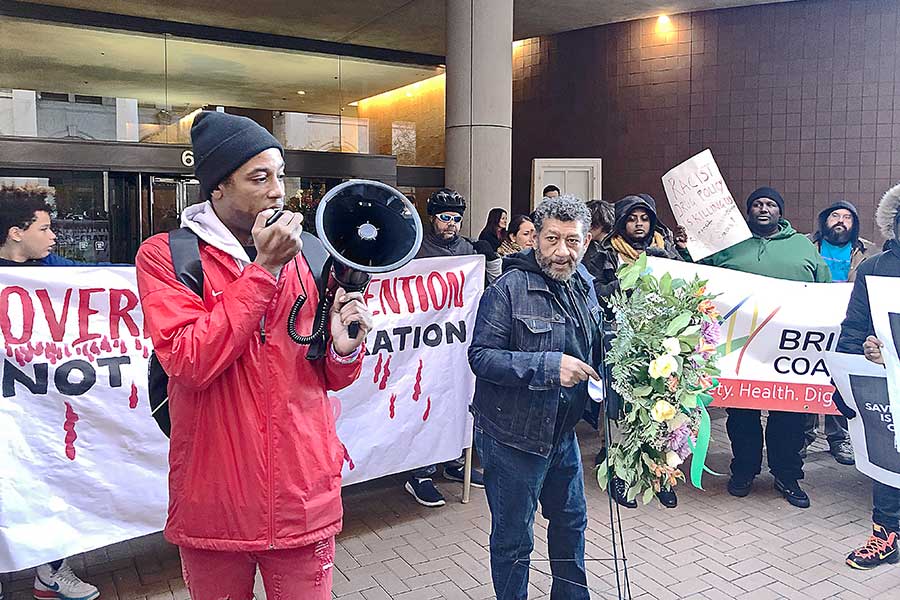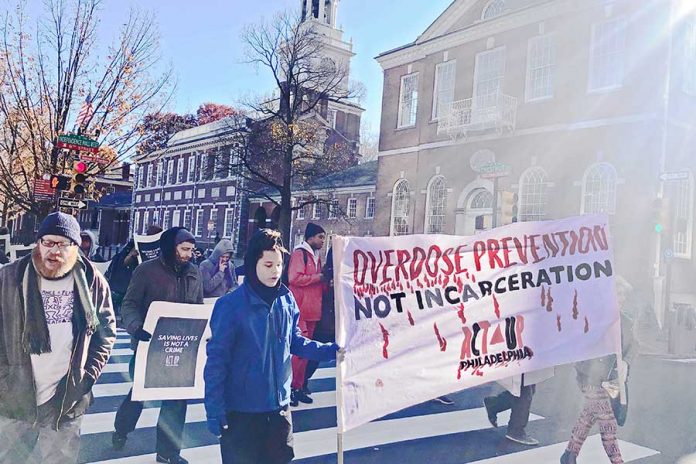Supporters of Safehouse, a Philadelphia-based proposed safe consumption site, marched across Independence Mall on Tuesday morning before rallying outside the office of William McSwain, the U.S. attorney for the Eastern District of Pennsylvania who has vowed to shutter the facility if it opens and arrest those who use it.
About 30 community members and representatives from HIV/AIDS and harm reduction groups including ACT UP Philadelphia, AIDS United, Angels in Motion and Friends of Safehouse attended the action, which took place in honor of World AIDS Day. Participants filled the air with chants of “overdose prevention, not incarceration” and “saving lives is not a crime.” Some organizers then entered the 6th and Market Streets office in an attempt to give McSwain a funeral wreath, golden urn and handwritten letters from people impacted by addiction describing the need for an overdose prevention site.

The objects were meant to prompt McSwain to “reflect on the people that have died and the people that will die under his threats, like the threat of intimidation,” said José de Marco, ACT UP Philadelphia organizer. “People are not going to use the site, they’re going to continue using in the street, and it’s going to generate even more overdoses and even more HIV.”
Federal Judge Gerald McHugh ruled Oct. 2 that Safehouse, which would be the first location in the United States where people can use illegal opioids under medical supervision, did not violate federal drug law. Days later, McSwain, the top federal prosecutor in the region, told Safehouse’s attorney in writing that he would “use all enforcement tools,” potentially including drug seizures, arrests and criminal forfeiture, to shut down the nonprofit.
About 100 supervised consumption sites operate across the world, mainly in Australia and Europe. The first North American site opened in Vancouver, Canada in 2003.
Organizers at Tuesday’s demonstration said McSwain’s stance is reminiscent of failed and racist “War on Drugs” policies. Safehouse could help address the systemic issue of addiction, which is often believed to mainly impact white people, de Marco told PGN.
In 2017, 1,217 known deaths from overdoses occurred in Philadelphia, according to city data. The following year, 1,116 instances took place.
Larry Colon, a 22-year-old person in recovery, attended Tuesday’s rally because he has seen too many teenagers and young adults develop addiction, he said.
“It goes from using to have fun to using to not get cold or using to stay warm or stay alive, because some people go through killing withdrawals when they get off of this stuff,” said Colon, who recently left a rehabilitation facility. “I just want the world to be as beautiful as it was when I was younger.”
Heather, who is in active addiction, said she has tried to be admitted to a facility “to save [her] life.” She said people with addiction often have overlapping mental health issues and often are denied insurance coverage.
“I’ve lost too many to this disease and a lot of people don’t see it as a disease, but it is because we use to numb ourselves. … I stand here today to fight for everybody who’s like myself and those who are [recovering],” Heather added.
For Mike, who is also in active addiction, a safe consumption site would help Philadelphians who use drugs access the health services they need. While Mike has health insurance, he said his partner, who has a physical disability, does not. After being poked by a used needle, she was denied the same services at a detox facility that Mike received at the same location in a similar situation, he said.
“You mean to tell me over a couple thousand dollars … you couldn’t get this woman medication to prevent her from getting HIV? That’s terrible,” Mike told the crowd.
Safehouse supporters argue the facility will save Philadelphia millions in tax dollars each year by reducing ambulance calls and infection diseases, prevent the spread of infectious diseases and increase the number of people who use drug detoxification and treatment services.
De Marco said he hopes McSwain received the message that his stance forces people to use drugs in an unsafe way and environment.
“We don’t want him arresting people. That’s the point of this,” he added. “We want to save lives. We don’t want [him] roadblocking us saving lives.”

